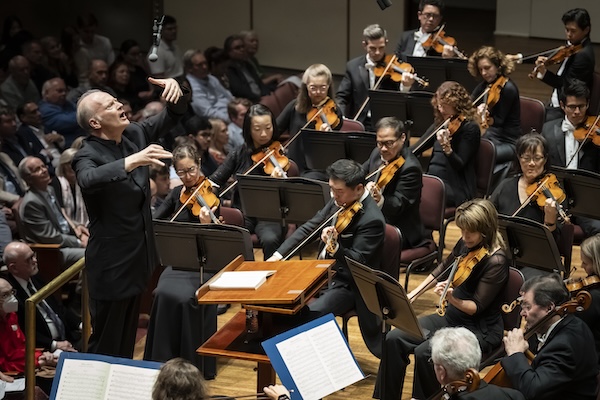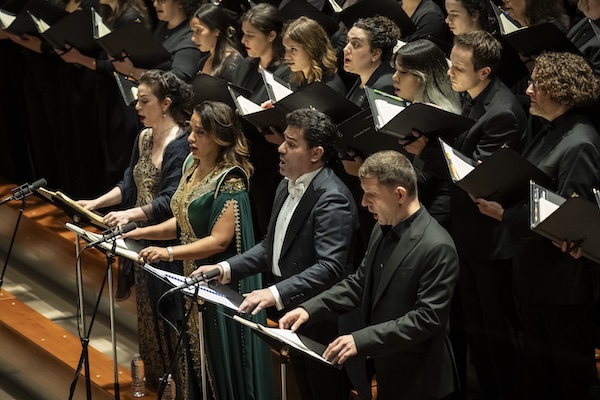Noseda, NSO offer a prayerful plea for peace with Beethoven’s “Missa Solemnis”

Gianandrea Noseda conducted the National Symphony Orchestra in Beethoven’s Missa Solemnis Thursday night at the Kennedy Center. Photo: Scott Suchman
Gianandrea Noseda closed his trifecta of large-scale masterworks with the National Symphony Orchestra Thursday night in the Kennedy Center Concert Hall. After Shostakovich’s Fourth Symphony and Mahler’s Sixth came Beethoven’s monumental Missa Solemnis. Initially planned for 2020, to mark the 250th anniversary of the composer’s birth, this program fell victim to the coronavirus pandemic, only to be resurrected for Noseda’s final appearance this season.
The elevation of Beethoven’s friend and patron, Archduke Rudolph, to the rank of Cardinal-Archbishop of Olomouc in 1819 drew the composer from the relative musical silence he had fallen into in recent years. This grand setting of the Latin Ordinary of the Mass is hardly a liturgical work, not ultimately completed until 1823, three years after Rudolph’s ordination. With its heavy use of counterpoint, chant-like declamation, and the ecclesiastical modes, however, it stands alone stylistically in Beethoven’s career.
Noseda led a performance to be cherished, combining grand tableaux of orchestral and choral sound with intimate chamber-like solo scenes along the way. From the opening of the Kyrie movement, the Italian conductor took great care with balances between orchestra and voices, but also among his soloists, helping to sculpt their collective sound as a quartet.
Soprano Erika Grimaldi, last heard in the NSO concert performance of Verdi’s Otello last year, displayed an inexhaustible reserve of vocal power, able to soar and shine above the massed forces throughout this 80-minute work. Mezzo-soprano Rihab Chaieb, who impressed in her Vocal Arts DC recital in 2022, provided a warm, maternal presence next to her, able to lift the treble side of the quartet in those stretches where the soprano remained silent.
Tenor Saimir Pirgu, who has appeared with Washington National Opera, did best in heroic passages. His underscoring of the words “Et homo factus est,” echoed by the men of the chorus, proved an intimate highlight, although when exposed in soft passages, his voice paled uncomfortably.
Bass-baritone Marko Mimica, another Noseda favorite heard in 2019, rumbled with tremendous volume, with a somewhat broad vibrato affecting his intonation. His solo moment in the Agnus Dei, accompanied again by male voices, marked the most moving point in the Mass. Turning to the minor key as if for a funeral lamentation, Beethoven the lapsed Catholic seemed to plead for mercy with affecting music, for himself as well as the whole world.

The vocal soloists Thursday night were (l to r) Erika Grimaldi, Rihab Chaieb, Saimir Pirgu and Marko Mimica. Photo: Scott Suchman
The large forces of the Washington Chorus, ably prepared by artistic director Eugene Rogers, responded to the often superhuman demands of the choral writing with brave force. In fugal sections, all parts could clearly be heard as they took up the subject, a clarity repeated when Beethoven repeated the melody in different permutations or layered it upon itself in stretto. Spread across the stage risers and the chorister seats above, the voices wielded intense volume and exceptionally clear diction, in a Germanic pronunciation of the Latin.
The NSO contributed its own memorable sounds to this tapestry, which filled the Concert Hall as if it were a cathedral. The Rubenstein Family Organ provided the organ part, remedying one of the disappointments of the NSO’s last performance of the work in 2012, when Christoph Eschenbach used a small continuo organ. Concertmaster Nurit Bar-Josef, her bow hand still in a brace after a recent injury, again fluttered luminously on the solo part of the Benedictus, as she did in 2012. The three trombones added the menace of hell in their sections of the Credo movement.
Noseda especially took his time with the Praeludium, the instrumental introduction to the Benedictus that corresponds to the moment of the Elevation in the Tridentine Mass. Scored for divided violas and cellos, doubled by woodwinds and with organ pedal reinforcing the double-basses on the lowest line, the Praeludium is poignantly reflective music. Noseda took the tempo quite slowly, compressing the sound into a sustained fabric of interwoven lines. Out of this mysterious moment in the score, Bar-Josef’s violin, shadowed by the two flutists, descended from the heights like a trio of angels to start the Benedictus.
The final message of the work, the plea for peace in the Dona Nobis Pacem, which silences the outbursts of war heard in the orchestra, is always needed in human affairs. As Noseda mentioned in his introductory remarks, although not intended, this performance coincided with the election of Pope Leo XIV one week ago in Rome. The new pontiff’s first words on the balcony of St. Peter’s Basilica included an exhortation to peace, “in your hearts, in your families, among all people, wherever they may be, in every nation and throughout the world.” One can only respond, “Amen.”
The program will be repeated 8 p.m. Friday and Saturday. kennedy-center.org

Photo: Scott Suchman


Posted May 16, 2025 at 7:15 am by Carl
Surprised to see so many people in the audience in the photo. I guess some Washingtonians aren’t adverse to giving money to the new regime.